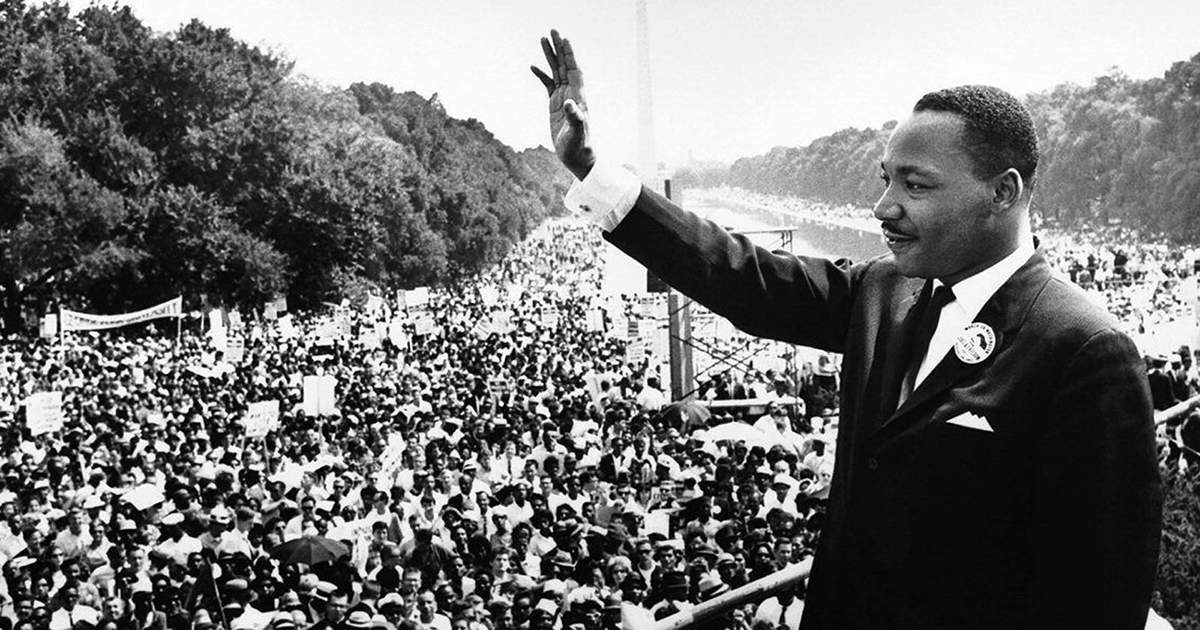
- Details
- By Levi Rickert
Opinion. In the United States, only two individuals are celebrated with national holidays named in their honor. One is Christopher Columbus and the other is Dr. Martin Luther King, Jr.
It should be understandable that Native Americans reject the celebration of Christopher Columbus, the lost sailor, with honor. Instead we have worked hard in recent decades to replace the day with Indigenous Peoples’ Day.
Dr. King, on the other hand, is rightfully celebrated among Native Americans. He was a powerful activist for Native rights, including water rights and tribal sovereignty, as well as the desegregation of Indigenous people. And his call for equality for all Americans resonates throughout Indian Country.
During my youth, Dr. King was a hero to me. I remember even drawing his portrait with chalk during my freshman year of high school art class. Through the years, I have read his writings often. As a Potawatomi, I have found Dr. King’s writings provide hope for underprivileged and underrepresented people, which Native Americans have been a part of throughout American history. Further, his call for social justice through non-violence fits my personality well.
In his 1963 book, Why We Can’t Wait, he referenced the origins of racism in the United States when he called the Indigenous people of this land the “original American.” Dr. King writes:
"Our nation was born in genocide when it embraced the doctrine that the original American, the Indian, was an inferior race. Even before there were large numbers of Negroes on our shores, the scar of racial hatred had already disfigured colonial society. From the sixteenth century forward, blood flowed in battles of racial supremacy. We are perhaps the only nation which tried as a matter of national policy to wipe out its indigenous population. Moreover, we elevated that tragic experience into a noble crusade. Indeed, even today we have not permitted ourselves to reject or to feel remorse for this shameful episode. Our literature, our films, our drama, our folklore all exalt it."
Dr. King’s acknowledgement of the attempt to decimate the Indigenous population, provides a powerful voice in the wilderness to tell the “shameful” story of several chapters of American history. Few non-Natives ever acknowledged the atrocities committed against our ancestors the way Dr. King did. They were too busy exalting the evil misdeeds of their ancestors.
Though Dr. King was killed a half-century ago, his work and ideas remain very relevant in America today.
We live in an America where democracy is seemingly under constant threat. In his momentous “I Have a Dream” speech, considered by scholars to be the most important political speech of the 21st Century, Dr. King said: “Now is the time to make real the promises of democracy.”
Yesterday, speaking at the Ebenezer Baptist Church in Atlanta where Dr. King served as pastor until his death, President Joe Biden became the first sitting president to deliver a Sunday sermon. He said:
“Are we a people who choose democracy over autocracy? You couldn’t ask that question 15 years ago, right? You would’ve thought democracy was settled – not for African Americans, but democracy as an institutional structure was settled. But it’s not, it’s not,” Biden said.
Dr. King’s call to make real the promises of democracy remains highly relevant today. Throughout his “I Have a Dream” speech, King wove a common thread in the call for equality, including equality in economic opportunities for all Americans. He described the U.S. Constitution and Declaration of Independence as a “promissory note” owed to all Americans. He described the inequality and economic injustice in America as a “bad check” given to Negroes, as African Americans were referred to in the early 1960s.
Of course, Dr. King’s call for equality also included Native Americans, who still face huge inequality gaps today when it comes to health care, housing, access to capital and voting rights. These have been problems our people have faced on this land for centuries, but we can’t just look back. We must also look forward.
I am trying to keep that in mind today as we celebrate Dr. Martin Luther King Day. It’s a time to reflect on his powerful speeches and meaningful achievements during a turbulent time in this country. More importantly, it’s a time to realize how his work a half-century ago is still highly relevant today because we, as a country, have so much work ahead of us to ensure the dream of equality for all Americans.
Thayék gde nwéndëmen - We are all related.
 Make A Monthly Donation Here
Make A Monthly Donation Here
More Stories Like This
The SAVE America Act Threatens Native Voting Rights — We Must Fight BackThe Presidential Election of 1789
Cherokee Nation: Telling the Full Story During Black History Month
Jesse Jackson Changed Politics for the Better
Native News Online at 15: Humble Beginnings, Unwavering Mission
Help us defend tribal sovereignty.
At Native News Online, our mission is rooted in telling the stories that strengthen sovereignty and uplift Indigenous voices — not just at year’s end, but every single day.
Because of your generosity last year, we were able to keep our reporters on the ground in tribal communities, at national gatherings and in the halls of Congress — covering the issues that matter most to Indian Country: sovereignty, culture, education, health and economic opportunity.
That support sustained us through a tough year in 2025. Now, as we look to the year ahead, we need your help right now to ensure warrior journalism remains strong — reporting that defends tribal sovereignty, amplifies Native truth, and holds power accountable.
 The stakes couldn't be higher. Your support keeps Native voices heard, Native stories told and Native sovereignty defended.
The stakes couldn't be higher. Your support keeps Native voices heard, Native stories told and Native sovereignty defended.
Stand with Warrior Journalism today.
Levi Rickert (Potawatomi), Editor & Publisher


